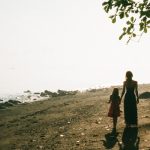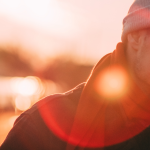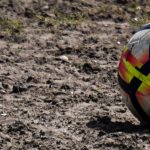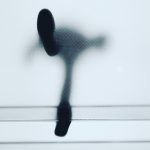1.
The milk is spoiled and has to be discarded.
I skip my bowl of Kix and berries and swill black coffee before heading out to the museum.
Chilled to the bone, I pedal along country roads, sleety-slick, past frigid fields where cows lay down in stiff mud. I crave warmth and sweetness, vanilla, honey and caramel. I park my bike outside the museum and stash my riding gear in a locker.
Leon, the Sunday docent, greets me, “Miserable spring weather.”
“Slippery,” I say and descend the spiral staircase to Level 1, under the tap-tap-tap of ice pinging on the skylight.
On the landing, a large cow faces me— “Return to the Farm,” an oil on canvas by Constant Troyon. The milky white horned beast, followed by her chocolate mate, fills an ornately gilded frame. Like Hathor, the Egyptian deity, she embodies the grace and confidence of harvest bounty. She’s “Queen for a Day,” a pastoral summer mother, enchantment of blue sky and frothy clouds. A pair of faceless sheep graze in the oil’s shadows.
Goosebumps rise on the nape of my neck and arms.
2.
Before social media, before Code Adams and Amber Alerts, we had milk cartons stamped with faces of missing children, warning parents: “Be careful … Teach your children… Stranger Danger.”
Milk conjures wholesome confections, like cookies or a sundae, drizzled with caramel, topped with whipped cream and a maraschino cherry. Children learned, “Don’t take candy from strangers,” but candy isn’t on the list of “good for you” foods, like milk, but, in our consciousness, milk, too, became linked to terror.
Once, I was a full-time mother and part-time speech therapist. I paid attention to the milk carton campaign but didn’t worry. In our small college town, amid corn fields and dairy farms, rich manure on the wind, placid herds ranged within their fences. I lived a rural dream on a dead-end gravel road that terminated at the “Farm,” 500 acres of uncultivated hills and ponds.
On mild spring days, before summer’s swelter and sleep-away camps, my daughters strolled with juice boxes, dolls, and stuffed animals to a wooded nook they named “Puppy Land.” By a stream in the shade across the road, they faded away, invisible to me, but could hear me when I called. In my kitchen, I channeled Donna Reed or Timmy and Lassie’s mom, baking cookies to serve with cold, fresh milk. When I returned the carton to the refrigerator, the Crowley cow, not a missing child, faced out.
We didn’t lock our doors.
3.
“Caramel” is a lovely word to utter, but we rarely use it in speech therapy. By the time, clients can form the /k/, the /m/, the /l/, the /r/, by the time they’re able to perform such articulation gymnastics, they no longer need our services.
When Robbie disappeared from his front yard, he was a client on my caseload. He lived on a farm on the outskirts of the county. At four years old, he had a lot to say but nobody could understand him. We were working on animal sounds, “baaa” and “mooo,” easy sounds to practice because they are bilabials, produced at the front of the mouth by pressing your lips together—- mmmmm. We had fun. He liked to play. We pretended to be sheep and cows.
4.
The cow’s hide is the color of French vanilla ice cream. Hints of honey and caramel smudge her knees and streak her tail like balayage.
When cows lie down, they buckle their forelegs under them. People say it signals showers. Perhaps she has just risen and is returning to the barn for milking. Maybe a storm is brewing and she wants to get out of the rain.
The “farm” near where I live is not real. It is a rich man’s development dream, a tax write-off. They know little of cows and farming or what it’s like to grow up rural poor, like Robbie
5.
The painting beckons. The cow’s hoof points towards a large boulder on the dirt path, warning me, Beware.
I’d like to touch her, to stroke her muzzle. May I? It’s velvet soft like kid gloves.
I will not be turned into leather.
I stumble on the rock.
Told you so. She sniffs, blinks. You can not bring the children back.
I know the truth of this. Mine are grown and gone. Robbie was never found.
I’ll just rest here a moment, I say. Then I’d like a drink of water. There must be a stream at the end of this trail, but, you know I’ve never milked a cow.
I will teach you.
I close my eyes and reach. I squeeze and pull, humming Joni Mitchell’s “Clouds,” and the cow grows bigger and bigger and I become smaller and smaller until her udders fill the sky and become the clouds of which I know too little. I bring my lips to the goddess to suckle, to drink her fresh milk, her earthy goodness.
I leave the education of young mouths and voices to others. We become the sky.
…
Biography
Joyce Ann Wheatley writes in Ithaca, NY. She works for the public library as reference and collections librarian for poetry, fiction and everything Dewey 800s. She loves reading, her cocker spaniels, gardening. Recent works in Gravel Magazine, Bath Flash Fiction Anthology, Barren Magazine and Stone Canoe (Syracuse, NY.). Twitter @joycea17.
Image: unsplash.com





